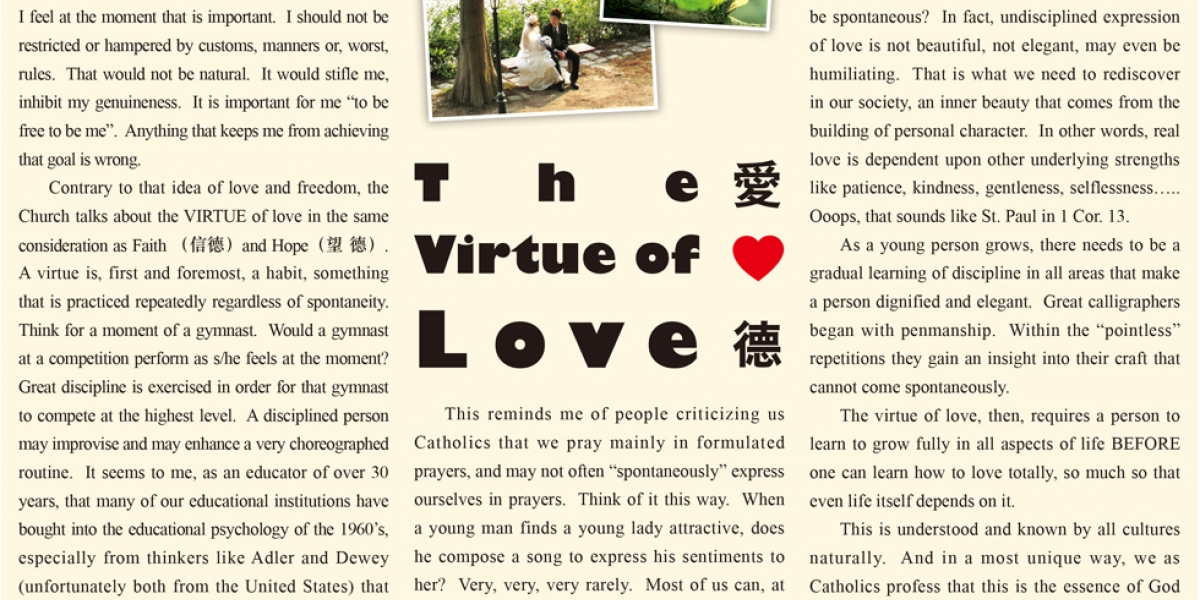
The Virtue of Love 愛德
Virtue ? 德 行
Yes, there is the word “virtue” when we, as Catholics, talk about love – while the pop culture (continuing from last article) does not include it. Therein lies the HUGH difference.
Pop culture primarily (that is, not all) regards love as an emotion, and therefore, spontaneous. It is how I feel at the moment that is important. I should not be restricted or hampered by customs, manners or, worst, rules. That would not be natural. It would stifle me, inhibit my genuineness. It is important for me “to be free to be me”. Anything that keeps me from achieving that goal is wrong.
Contrary to that idea of love and freedom, the Church talks about the VIRTUE of love in the same consideration as Faith (信德)and Hope(望 德). A virtue is, first and foremost, a habit, something that is practiced repeatedly regardless of spontaneity. Think for a moment of a gymnast. Would a gymnast at a competition perform as s/he feels at the moment? Great discipline is exercised in order for that gymnast to compete at the highest level. A disciplined person may improvise and may enhance a very choreographed routine. It seems to me, as an educator of over 30 years, that many of our educational institutions have bought into the educational psychology of the 1960’s, especially from thinkers like Adler and Dewey (unfortunately both from the United States) that somehow students should be taught to explore “free” expression without learning the basics. Think about the idea of “experiencing” the knowledge of mathematics without learning how to count.
This reminds me of people criticizing us Catholics that we pray mainly in formulated prayers, and may not often “spontaneously” express ourselves in prayers. Think of it this way. When a young man finds a young lady attractive, does he compose a song to express his sentiments to her? Very, very, very rarely. Most of us can, at best, find a beautiful CD and give it to her. Some couples would notice a particular situation and the music that happened to be there and use that music to commemorate the romantic occasion. Have you ever attended a wedding where the groom or the bride would sing a song freely and spontaneously to show their love for each other? You got it. That is why we use beautiful songs and words, called hymns, at Mass to enhance our worship. Non- Catholic churches do the same.
So why do young people think that Love should be spontaneous? In fact, undisciplined expression of love is not beautiful, not elegant, may even be humiliating. That is what we need to rediscover in our society, an inner beauty that comes from the building of personal character. In other words, real love is dependent upon other underlying strengths like patience, kindness, gentleness, selflessness….. Ooops, that sounds like St. Paul in 1 Cor. 13.
As a young person grows, there needs to be a gradual learning of discipline in all areas that make a person dignified and elegant. Great calligraphers began with penmanship. Within the “pointless” repetitions they gain an insight into their craft that cannot come spontaneously.
The virtue of love, then, requires a person to learn to grow fully in all aspects of life BEFORE one can learn how to love totally, so much so that even life itself depends on it.
This is understood and known by all cultures naturally. And in a most unique way, we as Catholics profess that this is the essence of God Himself and that we are created to live that kind of love.
Next we will look at marriage and sex within that context.






